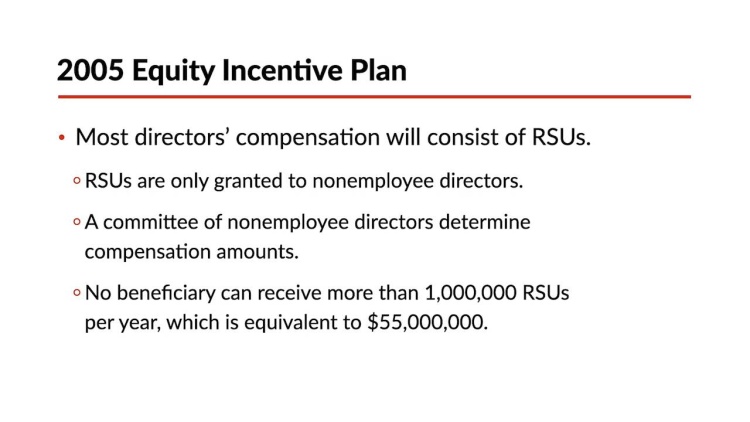Calma v. Templeton
Delaware Court of Chancery
114 A.3d 563 (2015), 2015 WL 1951930 (2015)

- Written by Sean Carroll, JD
Facts
Citrix Systems, Inc. (Citrix) (defendant) paid its non-employee directors (defendants) pursuant to its Equity Incentive Plan (the Plan), which was approved by a majority of disinterested stockholders. The Plan did not directly specify compensation amounts for non-employee directors, but it established a compensation committee to determine such amounts. The Plan gave the compensation committee absolute authority to determine specific compensation amounts, with the exception that it established a generic limit on each person’s annual compensation. However, this limit was one million shares, which, during the relevant time period, was worth approximately $55 million. The compensation committee consisted of three of the non-employee-director defendants. From 2011 to 2013, the defendants’ compensation was generally in the range of $300,000 to $400,000. Citrix stockholders did not approve any of these specific compensation amounts. John Calma (plaintiff), a Citrix stockholder, brought a derivative suit against the defendants alleging, among other things, a breach of the fiduciary duty of loyalty. The defendants filed a motion to dismiss for failure to state a claim, arguing that the Citrix stockholders had ratified the Plan, and thus any compensation awarded thereunder.
Rule of Law
Issue
Holding and Reasoning (Bouchard, J.)
What to do next…
Here's why 899,000 law students have relied on our case briefs:
- Written by law professors and practitioners, not other law students. 47,000 briefs, keyed to 994 casebooks. Top-notch customer support.
- The right amount of information, includes the facts, issues, rule of law, holding and reasoning, and any concurrences and dissents.
- Access in your classes, works on your mobile and tablet. Massive library of related video lessons and high quality multiple-choice questions.
- Easy to use, uniform format for every case brief. Written in plain English, not in legalese. Our briefs summarize and simplify; they don’t just repeat the court’s language.





